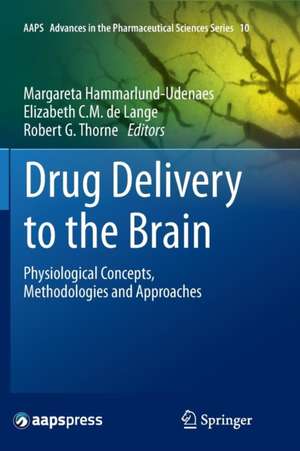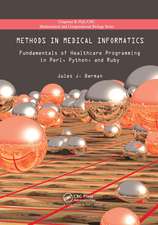Drug Delivery to the Brain: Physiological Concepts, Methodologies and Approaches: AAPS Advances in the Pharmaceutical Sciences Series, cartea 10
Editat de Margareta Hammarlund-Udenaes, Elizabeth C.M. de Lange, Robert G. Thorneen Limba Engleză Paperback – 23 aug 2016
| Toate formatele și edițiile | Preț | Express |
|---|---|---|
| Paperback (2) | 1129.33 lei 6-8 săpt. | |
| Springer – 23 aug 2016 | 1129.33 lei 6-8 săpt. | |
| Springer International Publishing – 25 mai 2023 | 1132.98 lei 6-8 săpt. | |
| Hardback (1) | 1139.61 lei 6-8 săpt. | |
| Springer International Publishing – 25 mai 2022 | 1139.61 lei 6-8 săpt. |
Din seria AAPS Advances in the Pharmaceutical Sciences Series
- 5%
 Preț: 1054.33 lei
Preț: 1054.33 lei - 5%
 Preț: 1487.04 lei
Preț: 1487.04 lei - 18%
 Preț: 1132.98 lei
Preț: 1132.98 lei - 18%
 Preț: 958.25 lei
Preț: 958.25 lei - 18%
 Preț: 960.42 lei
Preț: 960.42 lei - 18%
 Preț: 1401.93 lei
Preț: 1401.93 lei - 18%
 Preț: 1563.24 lei
Preț: 1563.24 lei - 18%
 Preț: 1233.69 lei
Preț: 1233.69 lei - 18%
 Preț: 952.57 lei
Preț: 952.57 lei - 15%
 Preț: 644.95 lei
Preț: 644.95 lei - 5%
 Preț: 1630.22 lei
Preț: 1630.22 lei - 24%
 Preț: 791.47 lei
Preț: 791.47 lei - 5%
 Preț: 1426.71 lei
Preț: 1426.71 lei - 15%
 Preț: 651.84 lei
Preț: 651.84 lei - 18%
 Preț: 947.35 lei
Preț: 947.35 lei - 18%
 Preț: 1560.73 lei
Preț: 1560.73 lei - 18%
 Preț: 1573.36 lei
Preț: 1573.36 lei - 18%
 Preț: 1395.47 lei
Preț: 1395.47 lei - 18%
 Preț: 1002.61 lei
Preț: 1002.61 lei - 18%
 Preț: 1388.99 lei
Preț: 1388.99 lei - 18%
 Preț: 1012.84 lei
Preț: 1012.84 lei - 18%
 Preț: 1235.43 lei
Preț: 1235.43 lei - 18%
 Preț: 1002.94 lei
Preț: 1002.94 lei - 18%
 Preț: 952.72 lei
Preț: 952.72 lei - 18%
 Preț: 1135.02 lei
Preț: 1135.02 lei - 18%
 Preț: 1409.21 lei
Preț: 1409.21 lei - 18%
 Preț: 995.17 lei
Preț: 995.17 lei - 18%
 Preț: 1019.35 lei
Preț: 1019.35 lei - 18%
 Preț: 1837.26 lei
Preț: 1837.26 lei - 15%
 Preț: 660.83 lei
Preț: 660.83 lei
Preț: 1129.33 lei
Preț vechi: 1377.23 lei
-18% Nou
Puncte Express: 1694
Preț estimativ în valută:
216.13€ • 223.27$ • 179.87£
216.13€ • 223.27$ • 179.87£
Carte tipărită la comandă
Livrare economică 25 martie-08 aprilie
Preluare comenzi: 021 569.72.76
Specificații
ISBN-13: 9781493943661
ISBN-10: 1493943669
Pagini: 751
Ilustrații: XX, 731 p. 150 illus., 126 illus. in color.
Dimensiuni: 155 x 235 x 38 mm
Greutate: 1.03 kg
Ediția:Softcover reprint of the original 1st ed. 2014
Editura: Springer
Colecția Springer
Seria AAPS Advances in the Pharmaceutical Sciences Series
Locul publicării:New York, NY, United States
ISBN-10: 1493943669
Pagini: 751
Ilustrații: XX, 731 p. 150 illus., 126 illus. in color.
Dimensiuni: 155 x 235 x 38 mm
Greutate: 1.03 kg
Ediția:Softcover reprint of the original 1st ed. 2014
Editura: Springer
Colecția Springer
Seria AAPS Advances in the Pharmaceutical Sciences Series
Locul publicării:New York, NY, United States
Cuprins
Anatomy and physiology of the blood-brain barriers.- Recent Progress in Blood-Brain Barrier and Blood-CSF Barrier Transport Research: Pharmaceutical Relevance for Drug Delivery to the Brain.- Blood-Brain Barrier (BBB) Pharmacoproteomics: A New Research Field Opened up by Quantitative Targeted Absolute Proteomics (QTAP).- Drug Metabolism at the Blood-Brain and Blood-CSF Barriers.- Pharmacokinetic Concepts in Brain Drug Delivery.- In vitro models of blood-brain barriers.- In situ and in vivo animal models.- Principles of PET and its Role in Understanding Drug Delivery to the Brain.- PKPD Aspects of Brain Drug Delivery in a Translational Perspective.- Drug Discovery Methods for Studying Brain Drug Delivery and Distribution.- Prediction of Drug Exposure in the Brain from the Chemical Structure.- Integrated Approach to Optimizing CNS Penetration in Drug Discovery: From the old to the new Paradigm and Assessment of Drug-Transporter Interactions.- Pharmacoeconomic Considerations in CNS Drug Development.- Intranasal Drug Delivery to the Brain.- Blood-To-Brain Drug Delivery using Nanocarriers.- Development of new Protein Vectors for the Physiologic Delivery of Large Therapeutic Compounds to the CNS- CNS Gene Therapy Utilizing Intravenously Administered Viral Vectors.- Neurosurgical Approaches: Drug Infusion Directly into the Parenchyma or Cerebrospinal Fluid.- Osmotic Opening of the BBB for Drug Treatment of Brain Tumors (Focus on Methodological Issues).- Emerging Engineering Technologies for Opening the BBB.- Disease Influence on BBB Transport in Inflammatory Disorders.- Disease Influence on BBB Transport in Neurodegenerative Disorders.- Drug Delivery in the Context of Stroke and Brain Trauma.- Which Drug or Drug Delivery Method can change Clinical Practice for Brain Tumor Therapy?.
Notă biografică
Margareta Hammarlund-Udenaes (PhD) is a Professor in Pharmacokinetics and Pharmacodynamics (PKPD) at Uppsala University and the Head of the Translational PKPD Group. Her research is focused at studying pharmacokinetic aspects of BBB transport of drugs in relation to CNS effects, which has led to the development of new concepts and methods within the BBB transport area, focusing on unbound drug relationships. Dr. Hammarlund-Udenaes is an Associate Editor of Pharmaceutical Research and a member of the Editorial Advisory Board of Journal of Pharmaceutical Sciences and Fluids and Barriers of the CNS. She became an American Association of Pharmaceutical Scientists’ Fellow in 2005. She is a frequent lecturer at conferences and in drug industry. Her company gives courses and advice in PKPD and BBB transport issues. She co-founded and has co-chaired several of the International Symposia on Microdialysis, and she is the Chair of the ‘Barriers of the CNS’ Gordon Conference in 2014.
Elizabeth C.M. de Lange (PhD) is Head of the Target Site Equilibration Group at the Division of Pharmacology of the Leiden Academic Center for Drug Research (LACDR). Her research program focuses on the development of generally applicable predictive PKPD models on CNS drugs using advanced in vivo animal models and mathematical modeling techniques, with a number of recent successes. She is an Editorial Board member of the journal Fluids and Barriers of the CNS, and an Editorial Advisory Board member of the Journal of Pharmaceutical Sciences and of Pharmaceutical Research. She has been the cofounder and (co-)Chair at the 1st, 2nd and 5th International Symposia on Microdialysis, and has been the Chair of the 9th International Conference on Cerebral Vascular Biology (2011). Among many other functions within the American Association of Pharmaceutical Scientists, she is the 2014 Chair of the Annual MeetingProgramming Committee. With her company “In Focus” (www.infocus-ecmdelange.nl) she provides courses, training and advice on microdialysis, pharmacokinetics, BBB transport, intra-brain distribution and PKPD relationships.
Robert G. Thorne (PhD) is an Assistant Professor in Pharmaceutical Sciences at the University of Wisconsin-Madison School of Pharmacy and also serves as a Trainer in the Neuroscience, Cellular & Molecular Pathology, and Clinical Neuroengineering Training Programs at the University of Wisconsin-Madison. Dr. Thorne was previously a research scientist and Faculty member in the Department of Physiology & Neuroscience at the New York University School of Medicine. His background includes a Ph.D. in Pharmaceutics (University of Minnesota) and a B.S. in chemical engineering (University of Washington). His research focuses on diffusive and convective transport within the CNS and the development, refinement and optimization of strategies for delivering biologics into the brain. He is a frequent invited speaker on topics related to CNS drug delivery for organizations within academia, foundations, and the biotechnology and pharmaceutical industry. Dr. Thorne is a founder and Council / Steering Committee member of the International Brain Barriers Society (http://www.ibbsoc.org/) as well as the 2016 Chair-elect for the ‘Barriers of the CNS’ Gordon Research Conference.
Elizabeth C.M. de Lange (PhD) is Head of the Target Site Equilibration Group at the Division of Pharmacology of the Leiden Academic Center for Drug Research (LACDR). Her research program focuses on the development of generally applicable predictive PKPD models on CNS drugs using advanced in vivo animal models and mathematical modeling techniques, with a number of recent successes. She is an Editorial Board member of the journal Fluids and Barriers of the CNS, and an Editorial Advisory Board member of the Journal of Pharmaceutical Sciences and of Pharmaceutical Research. She has been the cofounder and (co-)Chair at the 1st, 2nd and 5th International Symposia on Microdialysis, and has been the Chair of the 9th International Conference on Cerebral Vascular Biology (2011). Among many other functions within the American Association of Pharmaceutical Scientists, she is the 2014 Chair of the Annual MeetingProgramming Committee. With her company “In Focus” (www.infocus-ecmdelange.nl) she provides courses, training and advice on microdialysis, pharmacokinetics, BBB transport, intra-brain distribution and PKPD relationships.
Robert G. Thorne (PhD) is an Assistant Professor in Pharmaceutical Sciences at the University of Wisconsin-Madison School of Pharmacy and also serves as a Trainer in the Neuroscience, Cellular & Molecular Pathology, and Clinical Neuroengineering Training Programs at the University of Wisconsin-Madison. Dr. Thorne was previously a research scientist and Faculty member in the Department of Physiology & Neuroscience at the New York University School of Medicine. His background includes a Ph.D. in Pharmaceutics (University of Minnesota) and a B.S. in chemical engineering (University of Washington). His research focuses on diffusive and convective transport within the CNS and the development, refinement and optimization of strategies for delivering biologics into the brain. He is a frequent invited speaker on topics related to CNS drug delivery for organizations within academia, foundations, and the biotechnology and pharmaceutical industry. Dr. Thorne is a founder and Council / Steering Committee member of the International Brain Barriers Society (http://www.ibbsoc.org/) as well as the 2016 Chair-elect for the ‘Barriers of the CNS’ Gordon Research Conference.
Textul de pe ultima copertă
This book describes the different approaches for drug delivery to the brain with an emphasis on the physiology of the blood-brain barrier (BBB) and the governing principles and concepts for drug delivery across the BBB. It contains cutting-edge methods for studying drug delivery and administering drugs into the brain. The book also explores different approaches for predicting human brain concentrations as well as the influence of disease and drug industry perspectives. In addition to wide-ranging coverage of physiological concepts relevant to central nervous system (CNS) drug delivery, a detailed review of brain structure, function, blood supply and fluids is also provided. In each chapter, descriptions of future challenges and unresolved questions are combined with points for discussion. This unique combination of material makes this book a valuable resource for students and for established academic and industry scientists looking to learn about state-of-the-art drug delivery research. It is also a source for stimulating new ideas among experts already performing CNS drug delivery research or working in related areas.
Margareta Hammarlund-Udenaes (Ph.D.) is a Professor in Pharmacokinetics and Pharmacodynamics (PK/PD) at Uppsala University and the Head of the Translational PK/PD Group. Her research is focused on studying pharmacokinetic aspects of BBB transport of drugs in relation to CNS effects, and it has led to the development of new concepts and methods within the BBB transport area, focusing on unbound drug relationships.
Elizabeth C.M. de Lange (Ph.D.) is Head of the Target SiteEquilibration Group at the Division of Pharmacology of the Leiden Academic Center for Drug Research (LACDR). Her research program focuses on the development of generally applicable predictive PK/PD models on CNS drugs using advanced in vivo animal models and mathematical modeling techniques, with a number of recent successes.
Robert G. Thorne (Ph.D.) is an Assistant Professor in Pharmaceutical Sciences at the University of Wisconsin-Madison School of Pharmacy. He was previously a research scientist and faculty member in the Department of Physiology & Neuroscience at the New York University School of Medicine. His research focuses on diffusive and convective transport within the CNS and the development, refinement and optimization of strategies for delivering biologics into the brain.
Margareta Hammarlund-Udenaes (Ph.D.) is a Professor in Pharmacokinetics and Pharmacodynamics (PK/PD) at Uppsala University and the Head of the Translational PK/PD Group. Her research is focused on studying pharmacokinetic aspects of BBB transport of drugs in relation to CNS effects, and it has led to the development of new concepts and methods within the BBB transport area, focusing on unbound drug relationships.
Elizabeth C.M. de Lange (Ph.D.) is Head of the Target SiteEquilibration Group at the Division of Pharmacology of the Leiden Academic Center for Drug Research (LACDR). Her research program focuses on the development of generally applicable predictive PK/PD models on CNS drugs using advanced in vivo animal models and mathematical modeling techniques, with a number of recent successes.
Robert G. Thorne (Ph.D.) is an Assistant Professor in Pharmaceutical Sciences at the University of Wisconsin-Madison School of Pharmacy. He was previously a research scientist and faculty member in the Department of Physiology & Neuroscience at the New York University School of Medicine. His research focuses on diffusive and convective transport within the CNS and the development, refinement and optimization of strategies for delivering biologics into the brain.
Caracteristici
Describes small and large drug delivery to the brain with emphasis on the physiology and concepts for drug delivery across the BBB and brain distribution Contains methods for studying drug delivery, routes, and approaches of drug administration and drug industry perspectives Cutting-edge and at the same time educational, so that the book can be used in high-level training of academic and industry scientists




















